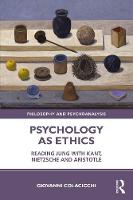Psychology as Ethics: Reading Jung with Kant, Nietzsche and Aristotle

Book Details
- Publisher : Routledge
- Published : 2020
- Cover : Paperback
- Pages : 154
- Category :
Jung and Analytical Psychology - Category 2 :
Psychoanalysis - Catalogue No : 95286
- ISBN 13 : 9780367529239
- ISBN 10 : 9780367529
Reviews and Endorsements
'This is an immensely important book for understanding Jung's thought and its connections to broader culture. Colacicchi argues compellingly that psychotherapy was for Jung inherently ethical, concerned with how we should live. He then clarifies in unprecedented detail the complex nature of that ethical thought, with its multiple and seemingly contradictory sources in Kant, Nietzsche, Aristotle, and Christianity. Lucid and perceptive, the book will facilitate philosophical engagement with Jung's thought as well as provide a fertile ground for studying analytical psychology comparatively with other traditions of psychotherapy.' - Roderick Main, Professor, Department of Psychosocial and Psychoanalytic Studies, University of Essex.
'...Colacicchi's volume will be the definitive discussion of Jung's moral theory for some time to come. Deeply knowledgeable about both Jung and moral philosophy, it is a rich and ambitious synthesis that illuminates timeless questions concerning the place of morality in our lives and Jung's unique understanding of them.' - Michael Lacewing, University College London, Co-editor of The Oxford Handbook of Philosophy and Psychoanalysis.
' In 1926 Nicolai Hartmann argued that the task of ethics is to achieve a synthesis of Nietzsche and Kant, while in 1943 Jung admitted that psychotherapists should really be philosophers - or are, in fact, already so. But what would this mean in practice? Giovanni Colacicchi offers a fresh and in-depth analysis that shows how Jung reshapes Kantian and Nietzschean themes, recasting them in the language of analytical psychology... essential reading for academic critics and clinical practitioners alike.' - Paul Bishop, William Jacks Chair of Modern Languages, University of Glasgow.
'This book is a welcome addition to the literature which sets out from the assumption that psychoanalytic writing - in this case, Jung's - and the Western canon in moral philosophy, which includes Aristotle, Kant and Nietzsche, are all part of the same conversation. In so doing, it helps to make the assumption compelling.' - Edward Harcourt, Faculty of Philosophy, University of Oxford and Keble College, Oxford.

